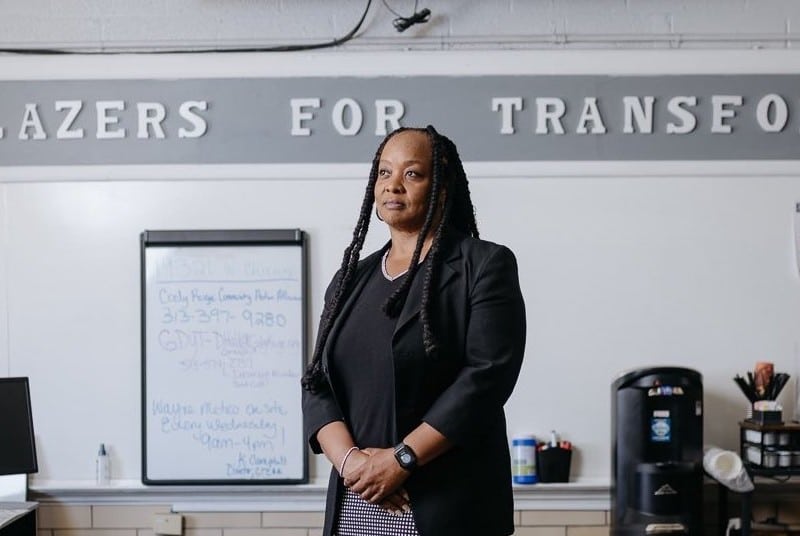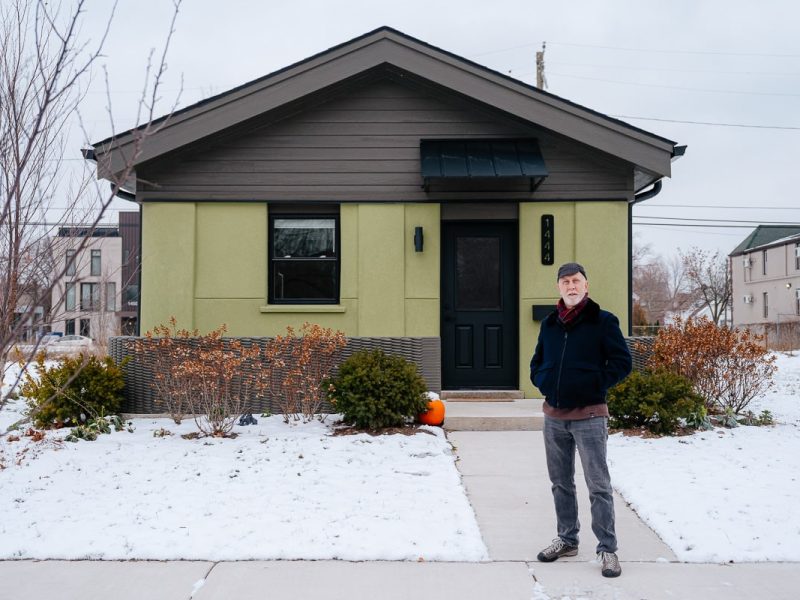Flower farm Detroit Abloom fosters connection between nature and community
In 2015, Detroit Abloom started as a way to show how cut flower farming can transform vacant land. Today its founders are looking to expand on its mission of cultivating a healthy relationship between the community and the planet by growing into a "holistic wellness center without walls."
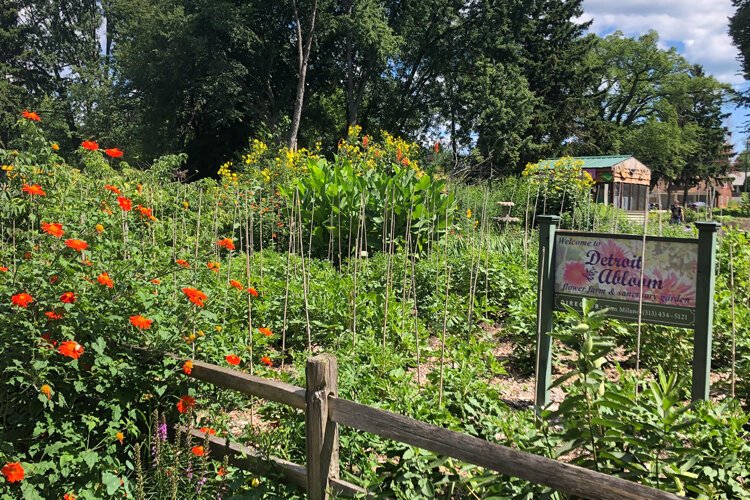
In 2015, Detroit Abloom started as a way to show how cut flower farming can transform vacant land. Today its founders are looking to expand on its mission of cultivating a healthy relationship between the community and the planet by growing into a “holistic wellness center without walls.”
Nestled on the 200 block of Manistique in Jefferson Chalmers, the flower farm and sanctuary garden on a recent summer day is in full bloom, with purple, red, and yellow flowers dotting the lush green landscape. Bumblebees and butterflies of all kinds dart from plant to plant. Benches and trellises sit in pockets between bushes of tall flowers. A rustic outdoor kitchen is starting to take shape — it has a firepit but is missing a sink and countertop at the moment. An 800-square-foot pond for local fish and vegetation is in the midst of construction; when completed, it will have two waterfalls and overflow into a stream underneath a bridge (a water feature is an essential part of a sanctuary garden, says director Tom Milano).
The pond, along with several other planned capital improvement projects, is a part of Detroit Abloom’s mission to evolve the farm into an outdoor wellness center, and the farm is looking to raise $120,000 to turn “Detroit Abloom into the paradise it was meant to be,” Milano says.
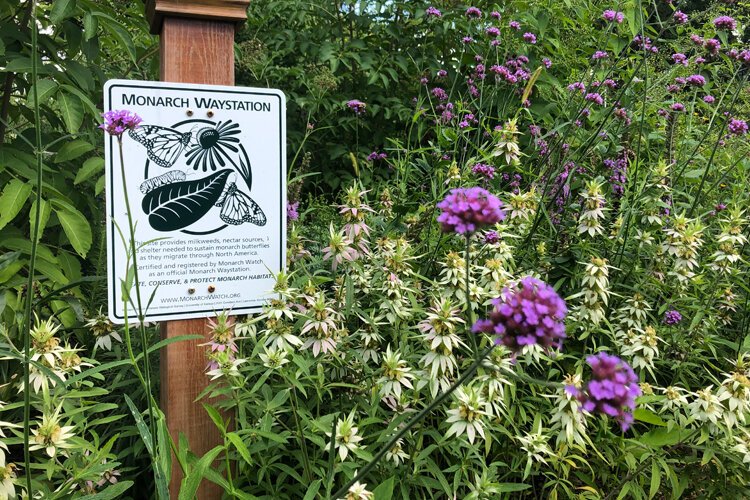
Milano’s journey to becoming a farmer started in 1972, when Milano — who was 22 at the time — chose to leave his home in Long Island, New York, to travel the world in a search for a deeper understanding of the world around him.
“I was two weeks away from becoming a high school biology teacher, and something told me not to get plugged into the system, so to speak, because I was really concerned about the world and all this racial disharmony and the destruction of the environment,” Milano says. “So, I got a 10-speed bike. I sold my car. I was a taxidermist and had collections of all kinds of animals, and I just gave up everything and I went cross country from Long Island to San Diego.”
He went from Hawaii to Japan to Iran to France, learning about different religions and ways of life during his journey. He became connected to the Hare Krishna movement, a branch of Hinduism, while hitchhiking, and he saw Eastern religions and the lifestyle as something he wanted to bring back to the U.S. when he returned in 1987.
He found his way to Detroit, initially to do food distribution, he says. “In Hare Krishna, food is sacred, it’s sanctified. It purifies people’s consciousness, I was really behind that. I thought, what better city than Detroit could really use some help, especially in 1987.” He was drawn to the city’s spirit and resilience, and he knew he wanted to be a part of its revival, “but from a spiritual perspective.”
From there, Milano got involved with and started up projects relating to food distribution. When he was traveling, he volunteered often with food distribution projects through the Hare Krishna temple, and wanted to bring that to Detroit.
He took up farming, originally focused on edible crops, and started up the Jefferson Chalmers Community Food System on city-owned land. There, he grew edible crops for the neighborhood and for restaurants to promote a local diet and eliminate waste, as well as employed people in the area.
“I realized that, God, all this vacant land in Detroit can be such a tremendous asset, not a liability,” Milano says. “In neighborhoods, we would clean up lots, and have people take care of those lots, but then I realized why not go a little further and actually turn the lots into beautiful landscapes and productive landscapes that create jobs.”
After six years, Milano was able to buy land of his own and acquired nine lots on the 200 block of Manistique. He received a Kresge Foundation grant to beautify the land — which is now known as Detroit Abloom — and show the community that nonedible crops can serve a purpose in the economy and in the neighborhood. This transitioned into what he does today with cut flower farming.
“They were looking for a group that could use nonedible crops to show by example, how you can use nonedible crops to create enough money to pay the land taxes and maintain the property,” Milano says. “So we applied for that grant and we won it, $76,000, which enabled us [to start Detroit Abloom]. At that point we felt let’s shift into flowers, nonedible crops. So that was the beginning.”
Detroit Abloom sells flowers of all varieties throughout the spring, summer, and fall in both one-time purchases and bouquet subscriptions. Their Community Supported Agriculture (CSA) bouquets are distributed throughout a 10-week period. This subscription allows customers to prepay for bouquets at the beginning of the season and pick them up throughout, which eliminates the middleman of a florist and helps support Detroit Alboom start up their season.
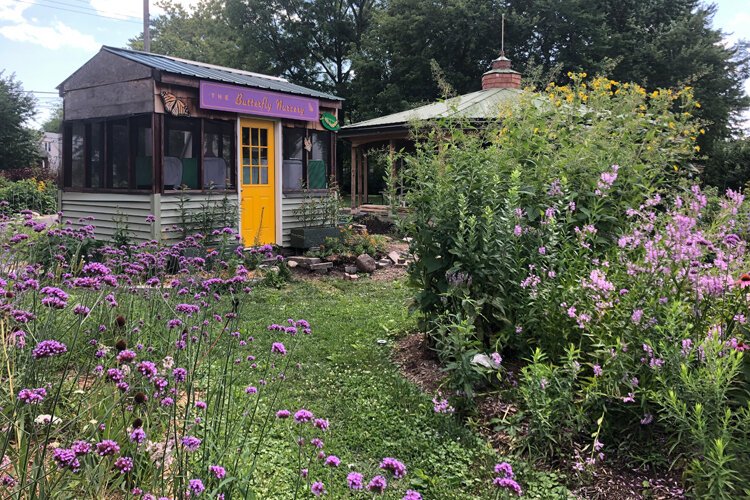
The farm also hosts events and workshops on their property where they discuss values and their spirituality. Weddings, parties, art therapy, yoga and meditation classes are all staples of the farm.
With his work, he hopes to bring in his philosophy of a higher purpose to life and a respect for nature.
“People are becoming attracted to the concepts [of our philosophy], and they want to partner with us,” Milano says. “They like the setting here, and they like the consciousness … All life is sacred, there’s a higher purpose to life. I like to sprinkle in that, you know, we’re here to bring about peace on this planet, let’s face it. The higher purpose is actually to go back to the spiritual world. You know this is not our home this material world, but we have to be like good tenants, you know, leave in better condition than it was when we got here.”
Detroit Abloom partners with local groups around Detroit, such as Bees in the D, to share their space and work together to achieve their goals of connecting with nature and the community. Bees in the D keeps four hives at the farm, and has been partnered with Milano since he started farming in the area.
“Some of our partners are big, but we love the grassroots collaboration,” says Brian Peterson-Roest, co-founder and president of Bees in the D. “For us, we love supporting local … [Like Milano,] we too feel like we really should enhance our partnerships with local [groups]. And while it may raise the prices a little bit, that’s OK because we want to take care of Southeast Michigan and Detroit and help stimulate growth here.”
Peterson-Roest films some of his “Forager Friday” videos — where he shares fun facts about pollinators — at Detroit Abloom as well. They have been partners since Bees in the D first started up and have been working together since. They share values in community and farming practices, both placing an emphasis on native biodiversity and ethical farming practices. According to Peterson-Roest, their collaboration with Detroit Abloom “was a perfect partnership.”
“People come in and we talk about this, it seems to resonate with a lot of people,” Milano says. “So as far as building communities, we invite people to, you know, work with us, join with us … to me that’s building community, inviting people into our space.”
As part of that, Detroit Abloom is crowdfunding to grow the sanctuary garden into an “urban oasis,” Milano says in the campaign video on GoFundMe. They are looking to raise $120,000 to purchase the house at 236 Ashland and three vacant lots to build a community center where they can offer classes and workshops and expand the gardens. Aside from buying the house, which “is a bit of a shell,” the farm is also raising money to repair the basement and roof and to create a room on the first floor with heat so classes can be held during the winter. They are also looking to build a nature trail and patio as well as add electricity to power the outdoor pavilion and kitchen.
“Essentially we want to create a space where people feel valued, where we see only the good in each other and where we come to understand how intimately we are connected as family and as equals,” Milano says.


